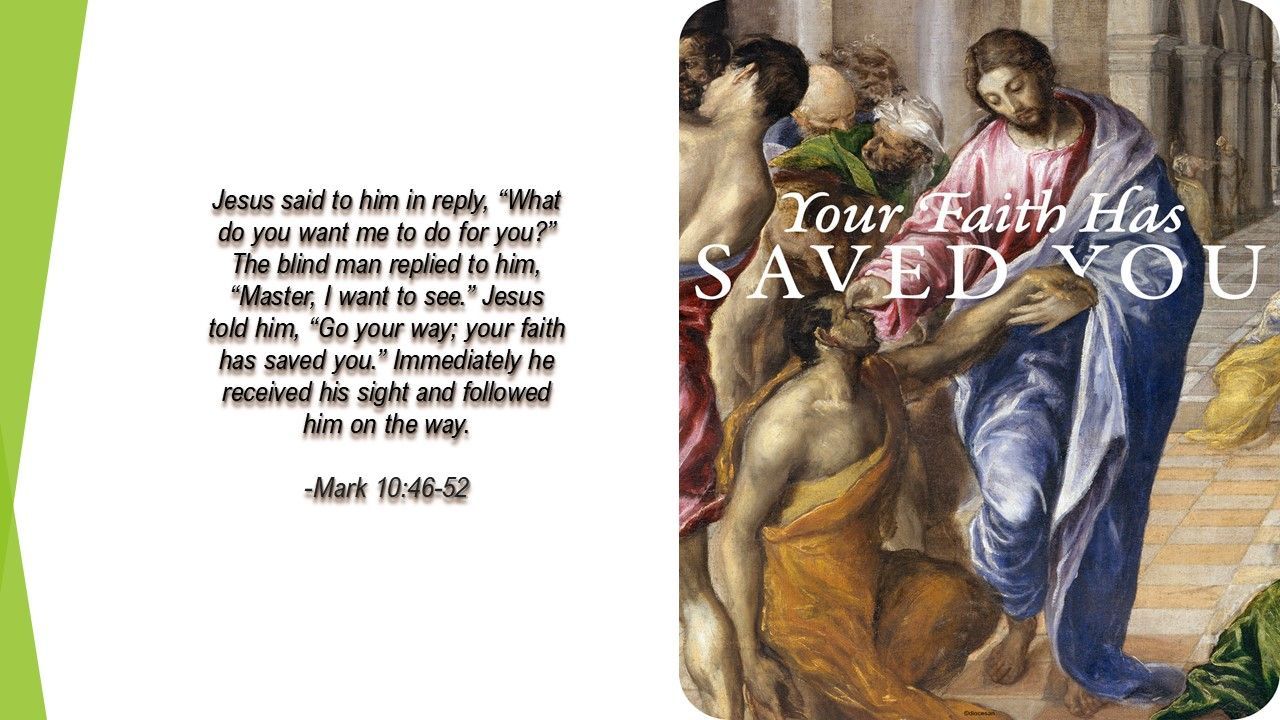Homily - 30th Sunday in Ordinary Time
Homily - 30th Sunday in Ordinary Time - October 27, 2024

Readings: Jer 31:7-9 Heb 5:1-6 Mk 10:46-52
One aspect of our human nature is that many of us do not like to wait. Most people hate waiting in line – or for a delayed event to start. Some even don’t wait for the final blessing to be commissioned at the end of mass. We dislike it when a project is held up – or when a trip postponed. Time always seems to drag when we must wait for something important.
During the time of prophet Jeremiah, the Chosen People were being scattered all over! Israel was led captive to Assyria; Judah was exiled to Babylon; some even fled to Egypt – taking the unwilling Jeremiah with them. In all this disruption and displacement, the faithful few had so little hope. Yet, these were the Remnant who kept their religious beliefs no matter where they happened to be.
Consequently, God used Jeremiah to bring them some comfort and hope. There would be a time of restoration. Every faithful person would be included- the blind, the lame, mothers with children, and those with a child in their womb would be brought back. This would happen because God was faithful and loved them. However, none of this happened for generations to come. And when that restoration finally began – it continued to evolve over hundreds of years! It was clear God had not abandoned his people.
Bartimaeus, from today’s gospel was someone who waited. He waited in suspense every day of his life. He was blind – He was a beggar. Each day he sat and waited for the coin or two that would sustain him. Bartimaeus was incomplete – and he knew it!
However, suddenly there was hope. Jesus of Nazareth was passing by. So Bartimaeus cried out for help. People tried to silence him, but he would not be silenced. He was persistent. Jesus stopped – had him brought forth and cured him.
We are incomplete – and we know it. Experience has proved this, time and time again. Nothing here, in this life, can completely fill us. True believers seem to know this and understand that only God can fill and fulfill them. But God’s plan for us takes time to unfold. And so much of our life is waiting for that plan to develop and take place in our own regard.
It is sometimes tempting to give up when we think God doesn’t answer our prayers. We can feel helpless or hopeless, ignored or forgotten. But the words of the psalm, the pleas of a grateful people, should offer reassurance in times of despair: “Restore our fortunes, O Lord…. those that sow in tears shall reap rejoicing”
Again and again, scripture calls on us to trust in God’s limitless love and generosity, and to be grateful for all he gives to those who have confidence and courage to trust. This is the true measure of faith. The familiar words from St Paul, captured in a popular hymn, tells us all we need to know: “We walk by faith, not by sight.” That was true of Bartimaeus, who rewarded for his faith by receiving sight.
Are we courageous enough, confident enough to trust like that? It is important to note how the story of Bartimaeus ends. The beggar who was given sight didn’t just head home---maybe to enjoy looking at all that he had never been able to see--- but, instead, made another choice. Mark tells us: “He received his sight and followed him on the way”. A new disciple was born. May we all give thanks to the Lord for all he does for us and resolve in our gratitude to follow him wherever he leads.
Finally, one of the wonderful aspects of stewardship spirituality is its balanced approach to all areas of life. As stewards, aware of our total dependence on God for everything, we come to Him with grateful hearts. Stewardship is not a fundraising scheme. Rather, it is way of life rooted in the teachings and the person of Jesus Christ using the God-given gifts to serve God and others, responding with gratitude. Stewardship is what we do after we say, “We believe”. Although God’s grace cannot be measured, there are some things we can view as evidence of His goodness flowing in our parish life and ministry. We are building a new Church because of commitment and sacrificial giving. This weekend we have the opportunity to listen to some stewards in our parish sharing their witness stories.
Homilies











